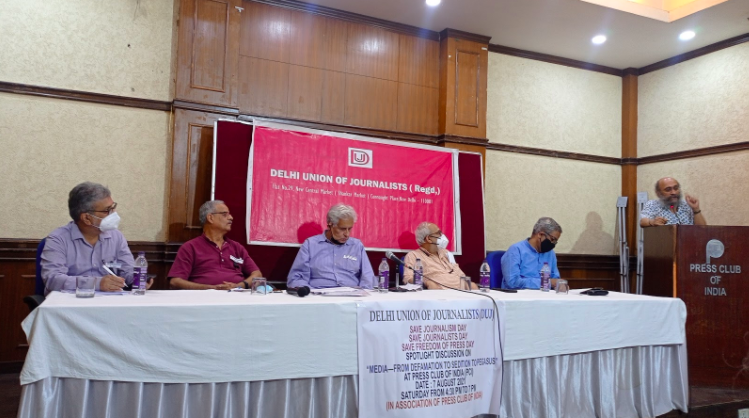‘Save Journalism Day’: Media Fraternity Demands Scrapping of Sedition Law, Probe Into Pegasus Snooping Issue

New Delhi: As press freedom rankings of India fall further, with more than 40 Indian journalists named as potential targets of snooping by Israeli spyware, Pegasus, and many others who continue to languish in jails charged under various draconian laws, journalists in Delhi on Saturday got together to demand a probe into alleged snooping of their mobile phones among other things.
The meeting, called “Save Journalism Day’ by Delhi Union of Journalists (DUJ), was held in the Press Club of India here. Among the participants were representatives of various journalist organisations and from the legal fraternity.
The meeting comes in the backdrop of writ petitions being filed in the Supreme Court by five journalists, whose phones were infected by Pegausus spyware, demanding a fair probe into the matter of violation of privacy and their fundamental rights.
Nearly 40 journalists are suspected to be on the list of those who were possibly targeted by the Pegasus spyware, an intrusive surveillance tool developed by Israel’s NSO Group for “vetted governments.” The global expose was done by Forbidden Stories, a France-based non-profit, and Amnesty International, which did forensic examination of some of the listed phones. The global expose was shared with various leading news organisations across the world, such as Washington Post, The Guardian, Le Monde, The Wire among others.
Speaking at the meeting, senior journalist Paranjoy Guha Thakurta, who is among the targeted journalists, said: "Why is there no FIR in this case? While the infiltration happened in 2019, the attack on journalists this time was far more sophisticated with the use of a no click spyware system. A case under the IT Act can be filed only when a person's own body has been violated. So in this case, the avenue of redressal and legal recourse remains limited."
Thakurta also raised other questions. "We need the government to answer who purchased the Pegasus spyware. Has any organisation agency of the government has purchased this software. Who has authorised this use? This goes beyond the questions of privacy," he added.
The India Press Freedom Report 2020, released by the Rights and Risks Analysis group, highlights the glaring reality of safety of journalists in India. The report points out that 228 journalists, including 12 female journalists, and two media houses were targeted during the year. Thirteen journalists were killed, 37 arrested or detained and 101 physically assaulted.
The Kerala Union of Journalists (KUJ) also expressed solidarity with the meeting that condemned ‘unfair’ targeting of journalists. Highlighting that their general secretary, Siddique Kappan, continues to languish in jail since October 2020 when he had gone to cover the story of a dalit gril’s rape case in Hathras, Uttar Pradesh, KUJ said Kappan had been charged with the draconian Unlawful Activities Prevention Act. Kappan has not yet been granted bail and the trial has also not started.
Another journalist from Manipur, Kishorechandra Wangkhem and activist Erendro Leichombam, were arrested on May 13 for a Facebook post that debunked cow urine as a cure for COVID-19. Both were arrested under the serious charges of National Security Act--put in place to control terrorist activities. Wangkem was released four days after the Supreme Court recently ordered the release of Leichombam.
Addressing the meeting, senior Supreme Court advocate Sanjay Hegde said India was now becoming one of the most unsafe countries for journalists.
News organisations are no more coopted, coerced or complicit in a regime where there is only one version of truth, he said, adding that the line where propaganda ends and where opinion begins was getting blurred.
“This is the stage we are at after 75 years of Independence. The modus operandi of the government has assumed a certain gradation -- if you can't shut down people with defamation then shut them down with sedition," he said, adding that "oppression, intimidation and surveillance can be met with unmatched defiance and awareness."
However, despite journalists highlighting the presence of these grave threats time and again, the government continues to deny any attack on press freedom. Quartz reported that during the ongoing Monsoon session of Parliament, information and broadcasting minister Anurag Thakur said in the Rajya Sabha that though the government has seen reports of India’s press freedom index ranking, it does not consider these relevant. “
Jaishankar Gupta of Press Association of India also pointed out the “grave danger’ being faced by journalists and journalism as a whole.
“What we are witnessing is a regime of fascism. The regime is intolerant toward dissent and is going on slapping draconian charges against mediapersons. If the agenda of state surveillance was in the national interest, why is there no terrorist organisation on the Pegasus list?” he said, adding that attacks on freedom of expression need to be fought together.
Among the demands raised at the forum was the scrapping of the colonial era sedition law which restricts freedom of expression and wrongfully targets journalists, as also a judicial probe into the infiltration of devices belonging to members of the press.
Get the latest reports & analysis with people's perspective on Protests, movements & deep analytical videos, discussions of the current affairs in your Telegram app. Subscribe to NewsClick's Telegram channel & get Real-Time updates on stories, as they get published on our website.






















